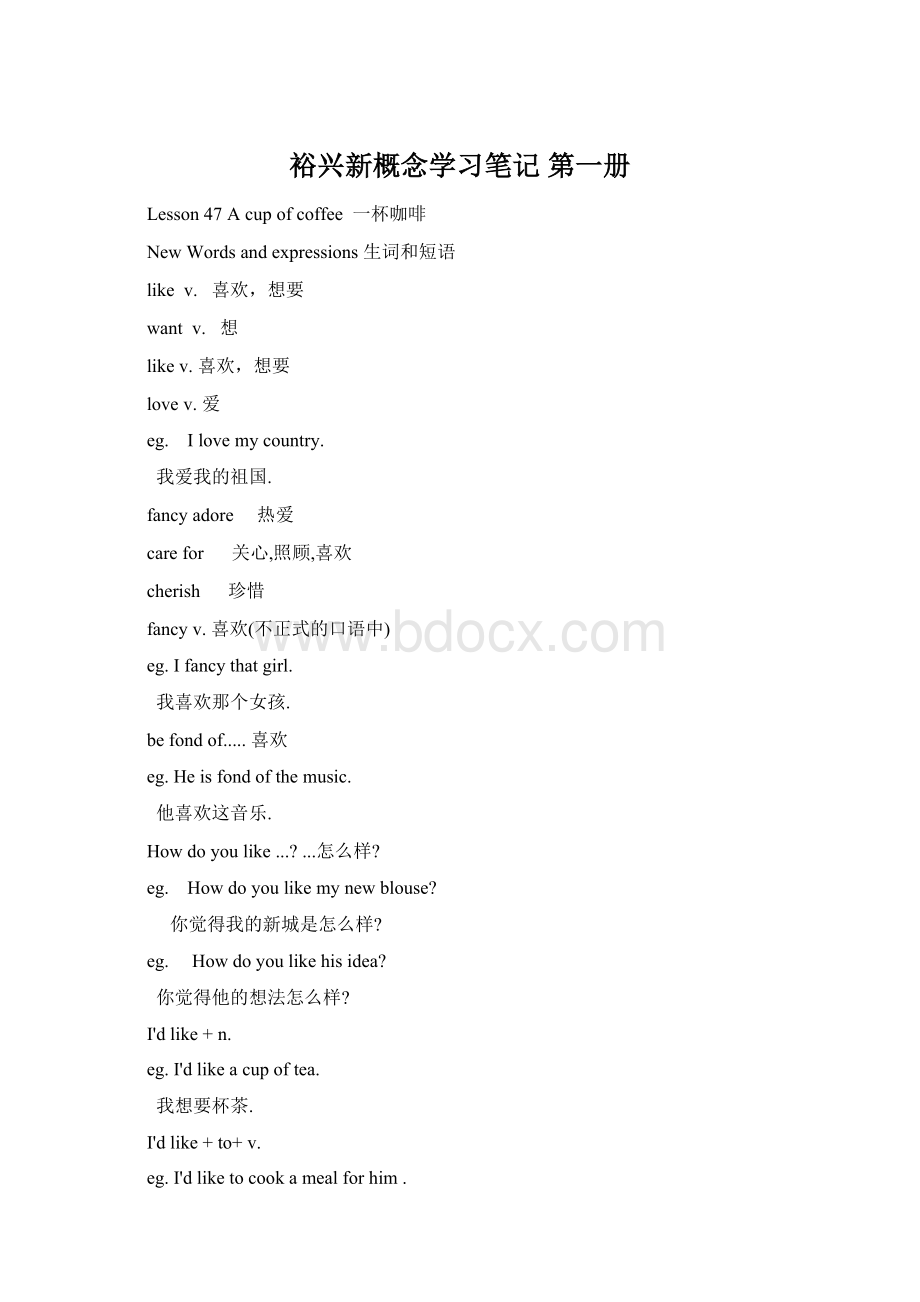裕兴新概念学习笔记 第一册文档格式.docx
《裕兴新概念学习笔记 第一册文档格式.docx》由会员分享,可在线阅读,更多相关《裕兴新概念学习笔记 第一册文档格式.docx(18页珍藏版)》请在冰豆网上搜索。

1.表示现在的事实和状态
eg.Myfatherisapoliceman.
我的父亲是一名警察.
It'
sveryhottoday.
今天天气很热.
Helivesinbeijing.
他住在北京.
2.表示现在的习惯性动作
Shegetsupat8o'
clockinthemorning.
她早晨八点钟起床.
Mymothercooksformyfamilyeveryday.
妈妈每天都为家人做饭.
Mrs.Smithcleanstheroomeveryday.
Smith太太每天都打扫这个房间.
3.普通真理
eg.Theearthgoesroundthesun.
地球围绕太阳转.
结构:
1.主语+系动词(be----is,am,are),说明目前的状态或一个事实,疑问句和否定句在be本身起变化.
eg.Hissisterisanurse.
AmIyourbestfriend?
Mr.blackandhiswifearenotinthekitchen.
What'
sinthebox?
Who'
sinherroom?
2.主语+动词(习惯性动作或事实等)
1)除单数第三人称外的代词(I,you,we,they),以及复数名词(herparents,theboysetc.)+动词原形
eg.WewatchTVatnight.
我们在晚上看电视.
Theywantsomeboxes.
他们想要一些箱子.
Ilikemusicverymuch.
我非常喜欢音乐.
Hersonsgotobedat9o'
clockeverynight.
她的儿子们每天晚上九点上床睡觉.
Mr.LeeandMissSmithmeetinthecompanyeveryday.
李先生和史密斯小姐每天都在公司见面.
Youandyourfriendlikesports.
你和你的朋友都很喜欢体育运动.
Shelikesapples.
她喜欢苹果.
Thedoctordrinkscoffeeeveryday.
这名医生每天都喝咖啡.
Hissongoestoschoolat8o'
clockeverymorning.
他的儿子每天早晨八点钟去上学.
HisgrandfatherlivesinShanghai.
一般疑问句:
助动词do,does来帮助完成疑问,"
do"
用在当复数名词作主语或第一、二人称及第三人称复数代词作主语的句子中.疑问句在句首加"
即可.
Dotheywantsomesugar?
Yes,theydo.
No,theydon'
t.
eg.Mr.LeeandMissGreenmeetinthecompanyeveryday.
DoMr.LeeandMissGreenmeetinthecompanyeveryday?
Yes,theydo.
Doyoulikemusicverymuch?
Yes,Ido.
No,Idon'
eg.YouandyourfriendlikeEnglish.
你和你的朋友都喜欢英语.
DoyouandyourfriendlikeEnglish?
主语是单数名词或单数第三人称代词时,变成一般疑问句,用"
does"
后面的谓语动词要用原形.
Shelikesenglish.
DoesshelikeEnglish?
Yes,shedoes.
No,shedoesn'
t
HisgrandfatherlivesinShanghai.
他的爷爷住在上海.
DoeshisgrandfatherliveinShanghai.
Yes,hedoes.
No,hedoesn'
eg.Thegirlcooksamealforhergrandmothereveryevening?
这个女孩每天晚上都为她的奶奶做饭.
Doesthegirlcookamealforhergrandmothereveryevening?
Yes,shedoes.
eg.Miketakesanumbrellaeveryday.
麦克每天都带着伞.
DoesMiketakeanumbrellaeveryday?
否定句:
含有实义动词的一般现在时的句子,在主语后面加don'
t(donot)或者doesn'
t(doesnot).
don'
t
当复数名词作主语或第一、二人称及复数第三人称代词作主语时,否定在主语后面加don'
t.
eg.Wedrinkmilkeveryday.
我们每天都喝牛奶.
Wedon'
tdrinkmilkeveryday.
我们每天都不喝牛奶.
Theyknowthat.
他们知道那件事.
Theydon'
tknowthat.
他们不知道那件事,
Heandhisparentslikethiscity.
他和他的父母喜欢这座城市.
Heandhisparentsdon'
tlikethiscity.
他和他的父母不喜欢这座城市.
doesn'
eg.Hissonwantsthattoy.
他的儿子想要那个玩具.
Hissondoesn'
twantthattoy.
他的儿子不想要那个玩具.
MissLeelikesthisdress.
李小姐很喜欢这件连衣裙.
MissLeedoesn'
tlikethisdress.
李小姐不喜欢这件连衣裙.
Theirfatherusuallyreadsanewspaperinthelivingroom.
他们的父亲通常在客厅里读报纸.
Theirfatherdoesn'
tusuallyreadanewspaperinthelivingroom.
他们的父亲通常不在客厅里读报纸.
当复数名词作主语或第一,二人称及复数第三人称代词作主语时,否定在主语后面加don'
主语是单数名词或单数第三人称代词时,变成否定句要分两步走:
1.在主语后面加doesn'
2.把后面的动词变成原形.
特殊疑问句:
特殊疑问句+一般疑问句句式
特殊疑问词:
what/who/where/when/how
一般疑问句句式:
由do/does引导
特殊疑问词+一般疑问句句式
1. 你喜欢什么?
eg. Whatdoyoulike…?
eg. What+doyoulike?
2.你的妈妈几点起床?
eg.Whendoesyourmothergetup?
When+doesyourmothergetup?
3.他的助理在哪打这封信?
eg.Wheredoeshisassistanttypethisletter?
Where+doeshisassistanttypethisletter?
动词第三人称单数形式的变化规则:
1.一般动词后面加"
s"
.
make-----makes(做)
take-----takes(带走)
want-----wants(想要)
cook-----cooks(做饭)
read-----reads(读)
find------finds(找到)
2.以s,x,z,ch,sh,o结尾的动词加es.
kiss------kisses(亲吻)
fix------fixes(修理)
catch------catches(抓住)
wash------washes(洗)
go------goes(走,去)
do------does(做)
3.以辅音字母加y结尾的动词,把y去掉加ies,
fly-----flies(飞行)
cry-----cries(哭)
study-----studies(学习)
4.以元音字母加y结尾的动词,直接在词尾加s.
pay------pays(付钱)
enjoy------enjoys(喜欢)
say------says(说)
一般现在时常用的时间状语:
always 总是
usually 通常
often 经常
sometime 有时
never 从不
everyday 每天
everyyear 每年
everymorning 每天早上
everynight 每天晚上
inthemorning 在早上
intheafternoon 在下午
TEXT课文Acupofcoffee
Question:
HowdoesAnnlikehercoffee?
安想要什么样的咖啡?
Listentothetapethenanswerthisquestion.
听录音,然后回答问题。
Blackcoffee,wantsugar.
安想要什么样的咖啡?
清咖啡,放点糖就行了。
(注意:
Doyoulike….和Doyouwant…的句型)
TEXT课文
CHRISTINE:
Doyoulikecoffee,Ann?
克里斯廷:
你喜欢咖啡吗,安?
ANN:
Yes,Ido.安:
是的,我喜欢。
Doyouwantacup?
克里斯廷:
你想要一杯吗?
Yes,please,Christine.安:
好的,请来一杯,克里斯廷。
Doyouwantanysugar?
你要放些糖吗?
Yes,please.安:
好的,请放一些。
Doyouwantanymilk?
要放些牛奶吗?
No,thankyou.安:
不了,谢谢。
Idon'
tlikemilkinmycoffee.我不喜欢咖啡中放牛奶,
Ilikeblackcoffee.我喜欢清咖啡。
Doyoulikebiscuits?
克里斯廷:
你喜欢饼干吗?
Yes.Ido.安:
Doyouwantone?
你想要一块吗?
Yes,please.安:
好的,请来一块。
课文讲解:
一般现在时的疑问句式.
Doyouwantacupofcoffee?
接受别人的建议:
Yes,please.
拒绝别人的建议:
No,thankyou.
some/any可以修饰不可数名词,或可数名词复数形式.sugar是不可数名词,因此肯定句中用some来修饰.疑问句中,把some变成any. 一般现在时的否定句式,主语I,在主语后面加don'
t来否定.
blackcoffee 清咖啡
whitecoffee 牛奶咖啡
one指biscuit
总结----一般现在时
当复数名词作主语或第一,二人称及第三人称复数代词作主语,疑问句用"
帮助完成.否定句在主语后面加don'
Lesson48Doyoulike.....?
你喜欢...?
Doyouwant...?
你想要...?
freshadj. 新鲜的
egg n.鸡蛋
butter n.黄油
pureadj.纯净的
honey n.蜜蜂
ripe adj.成熟的
banana n.香蕉
jamn.果酱
sweetadj. 甜的
orangen.橙子
Scotchwhisky 苏格兰卫生局
choiceadj.上等的,精选的
applen.苹果
winen.果酒
beern.啤酒
blackboard n.黑板
fresh
1.adj新鲜的
eg.Openthewindowandairtheroom.let'
sgetsomefreshair.
打开窗户,给房间通通风,让我们呼吸一下新鲜空气.
freshfruits新鲜的水果
2.adj.最新的
freshnews 最新消息
breakfreshground 开辟新天地,做以前从未做过的事
eggn.鸡蛋
eg.Iwantsomeeggs.
我想要一些鸡蛋.
Doyouwantanyeggs?
我想要一些鸡蛋吗?
Yes,Ido
No,Idon'
putalltheeggsinonebasket
把注全压在一个地方,冒很大的风险.
buttern.黄油(不可数名词)
Doyouwantanybutter?
Yes,Ido.
No,Idon'
eg.Theydon'
twantanybutter.
pureadj.纯净的
purewater纯净水
honeyn.蜜蜂
eg.Hedoesn'
twantanyhoney.
honey亲爱的(称呼)(Am.)
eg.Honey,comehere.
honeymoon蜜月
ripeadj.成熟的
aripeapple一个成熟的苹果
eg.Thetimeisripe.
时机成熟了.
bananan.香蕉
-----Doeshelikebananas?
theripebanana.成熟的香蕉
jam
1.n.果酱
tlikejam.
他们不喜欢果酱.
Doyouwantanyjam?
你想要一些果酱吗?
2.n.堵塞
atrafficjam交通堵塞
sweet
1.adj甜的
eg.Theappleisverysweet.
souradj.酸的
bitteradj.苦的
saltyadj.咸的
spicyadj.辣的
sweet-and-souradj.酸甜的
2.n.糖果(Br.)
candy糖果(Am.)
orangen.橙子、橘子,橙色,橘黄色
eg.Givemesomeoranges.(橘子)
Whatcolourareyournewtrousers?
Theyareorange.(橘色)
Scotchwhisky苏格兰威士忌
choice
1.adj.上等的,精选的
choiceapples上等的苹果
2.n.选择
makeachoice作出选择
applen.苹果
eg.Therearesomeapplesandanorangeinthebasket.
篮子里有一些苹果和一个橘子.
Thereisanorangeandsomeapplesinthebasket.
篮子里有一个橙子和一些苹果.
theappleofsb'
seye某人最喜欢的人和物
eg.Hersonistheappleofhereye.
她的儿子是她的至爱.
winen.酒,果酒(不可数)
eg.Iwantsomewine.
我想要喝些酒.
eg.Sheisdrinkingbeerwithherfriend.
她正和她的朋友一起喝啤酒.
alcoholn.烈性酒;
白酒
blackboardn.黑板
black黑色的
board 板
blacktea红茶
Grammar-----介词
off
falloff
eg.Thesebottlesarefallingoffthetable.
jumpoff
eg.Thechildredarejumpingoffthetree
over
1.跨越(一段距离)
flyover
eg.Anaeroplaneisflyingoverthebridge.
jumpover
eg.Canyoujumpoverthewall?
gooverto
eg.SheisgoingovertoBritain.
comeover
eg.Comeoverhere.
2.在...的正上方(不接触物体表面)反义词under
eg.Thebridgeisovertheriver
Therearesomeshipsunderthebridge.
above在...斜上方(不接触物体表面,上方区域,不一定是正上方)反义词:
below
eg.Thereisapictureabovethedesk.
Thereisacarbelowourwindow.
on在...上面(接触物体表面) 反义词:
beneath
eg.Yourumbrellaisonthechair.
Youpenisbeneaththebook.
between在两者之间
eg.Thislittlegirlissittingbetweenherparents.
among在...之间(三者或三者以上)
eg.Sheisstandingamongthecrowd.
along 沿着
runalong
eg.Theyarerunningalongthestreet.
walkalong
eg.Sheiswalkingalongtheriverbank.
across穿过(在...表面上穿过,横穿)
swimacross 游过
eg.Thetwoboysswimacrosstherivereveryday.
walkacross 走过
eg.Becarefulwhenyouwalkacrossthestreet.
goacross 穿过
runacross 跑过
through在内部穿过
eg.Theyaregoingthroughtheforest.
infrontof 在...的前面 反义词:
behind
eg.Don'
tstandinfrontoftheblackboard.
Thedogisbehindthebox.
inthefrontof在...本身的前部
eg.Theteacherisstandinginthefrontoftheclassroom.
时间和顺序的先后:
before(在...之前) 反义词:
after
eg. Beforeyou